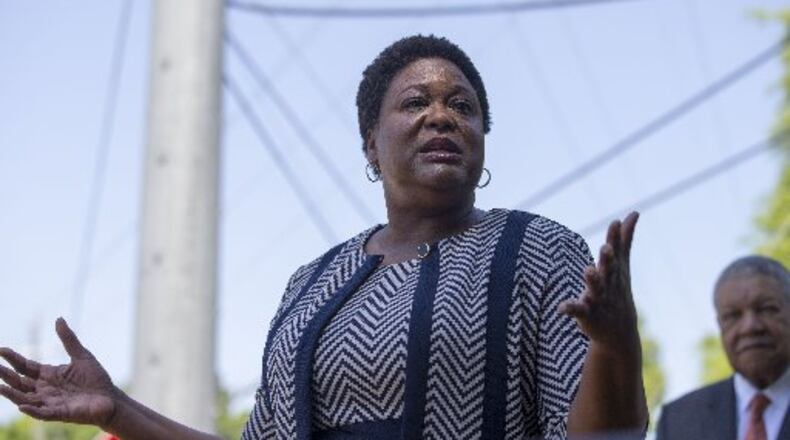Atlanta City Council President Felicia Moore on Wednesday called on her fellow council members and Mayor Keisha Lance Bottoms to quickly establish the Office of Inspector General to hold elected officials, city employees and contractors accountable for unethical and unlawful behavior.
Moore's letter was sent about one month after a task force created by Bottoms recommended the city hire an inspector general that would be independent of the mayor's office and the council.
In an interview, Moore said the city must act fast to restore trust in city government as revelations of alleged corruption continue piling up. Moore said an inspector general would also help stave off any attempt from state lawmakers to take over the city’s airport.
“We want to make sure that that citizens have some hope that we are trying to work to address transparency, ethics and accountability,” Moore said. “And the biggest piece is the accountability.”
In a letter to the mayor and council, Moore outlined ten policy recommendations for the office, including arming the Inspector General with subpoena power and the ability to hire outside lawyers for investigations. She also suggested beefing up whistleblower protections; establishing baseline budgets for the IG, auditor and ethics office; and creating provisions that require city officials and contractors to cooperate and be truthful with investigations.
Moore also made a couple of suggestions that are sure to stir up political controversy.
Among them: that the Office of Contract Compliance, the Law Department’s compliance officer and the city’s new transparency officer fall under the Inspector General’s authority. Those offices currently report to the mayor.
A spokesman for Bottoms issued a statement saying the administration appreciates the task force’s work and “we are working with members of Council to place the Task Force’s recommendations into action.”
Moore said an Inspector General would fill a key void in City Hall’s checks and balances — investigating a wide range of wrongdoing, recommending punishment and referring matters for criminal prosecution.
The past two years have brought a steady stream of revelations of corruption in Mayor Kasim Reed’s administration, and Bottoms has occasionally clashed with the council over who will lead the effort to reform City Hall.
The council this year created an Office of Independent Compliance to investigate fraud, theft and other violations. At the time, it marked the city's most sweeping effort to correct corrupt and inappropriate acts that have been highlighted by a multi-year federal investigation, and by media reports.
Bottoms in June agreed to allocate $800,000 to fund the position, but a compliance officer has yet to be appointed partly because a report from the trust task force last month recommended that the city establish an Office of Inspector General — an almost identical position to the Compliance Officer, but with expanded power.
As the maneuvering played out, allegations of wrongdoing continued piling up.
In September, a federal indictment revealed that Atlanta's top contract compliance officer was paid $220,000 over five years for helping companies obtain government contracts — including with the city of Atlanta — as part of an undisclosed side business he operated Reed's brother, Tracy.
Over the past few months, the Atlanta Journal-Constitution has reported that the city's former Chief Financial Officer bought machine guns with city money; that Reed used funds that he previously designated to charity to pay for his health insurance after he left office; and that Reed's wife, who was not a city employee, wrecked a city SUV causing more than $16,000 in damage to a vehicle she was not authorized to drive.
Councilman Howard Shook said he finds himself wishing more and more each day that the Inspector General’s Office was up and running.
“From what I can see, there is a broad consensus between the administration on implementing the Inspector General’s office,” Shook said.
But Moore said she’s worried that some of the perceived complexities of empowering the Inspector General will slow progress.
“I think we can convolute and confuse and complicate what needs to happen,” Moore said.
One potential complication relates to subpoenas.
According to the Public Trust Task Force’s report, subpoena power is essential to Inspector General’s success. Under current law, city-issued subpoenas would be enforced by the municipal court, whose enforcement powers are restricted to the city limits. Moore’s recommendations include seeking a change in state law that would broaden an Inspector General’s subpoena powers. But she said that hurdle is no reason to wait on establishing the position.
Councilman Michael Julian Bond said he was in favor of moving forward with the position so long as it didn’t duplicate the duties of any other position.
“We don’t want people confused about were to go when there’s an issue,” Bond said.
About the Author
Keep Reading
The Latest
Featured

